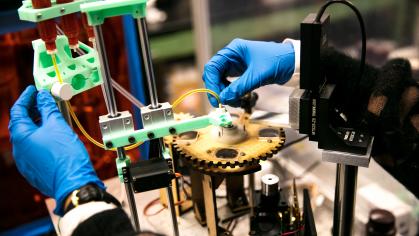Innovation in America, the Role of Universities, and How to Build a More Diverse and Inclusive Environment
“Inclusive innovation is the idea that technology
innovation should be as diverse as our nation.”
- Professor Jeffrey Robinson, PhD
In today’s competitive global environment, universities play an important role in inspiring diversity among new generations of entrepreneurs and innovators to improve the innovation ecosystem. Providing underrepresented researchers with access to opportunities and networks can bring the needed change to better reflect the diversity of our nation and to tip the scale toward equity and inclusion in innovation.
According to Jeffrey Robinson, PhD, professor and academic director of The Center for Urban Entrepreneurship & Economic Development at Rutgers Business School, “Diversity is about representation and ‘who is at the table or in the room’. But equity and inclusion are just as important concepts that should be discussed at the same time as diversity. Equity is about fairness for those in the room. Inclusion is about the climate in the room or organization. Inclusion addresses the question, ‘does everyone feel that they belong here?’”
Although the next generation of innovators are bringing their big ideas to the innovation landscape and finding solutions to improve people’s lives and the world in which we live, women and underrepresented groups and minorities (URM), including Black or African American, Hispanic/Latinx, Native American or American Indian, women, LGBTQI+ and people with disabilities.
How can universities open the doors for them to feel welcomed and provide guidance for their inventions to be impactful and to be developed into successful startups or businesses?
Robinson explains that universities have been successful in using “on-ramp” programs for minorities and women interested in innovation and entrepreneurship by introducing and demystifying a process that is often not discussed in science, technology, engineering, and mathematics (STEM) doctoral programs. The programs usually have a mentoring component and link the participants with successful URM innovators, which makes a big difference because some of these STEM spaces are not very welcoming to minorities and women, according to Robinson.
In fact, Robinson and other researchers, including Todd M. Inouye from the University of Hawai’i and Amol M. Joshi from Oregon State University, have reported that federal agencies like the National Institutes of Health have found that insufficient outreach exacerbates the problem of lower participation of women and minorities in STEM fields affecting the amount of grant applications for research and development for underrepresented groups and their potential steps towards entrepreneurship.
“African Americans, American Indians/Alaska Natives, and Latinos— who have historically comprised a minority of the U.S. population are growing in size and influence. Currently, they constitute 30 percent of the U.S. population, but by 2050, these groups will account for greater than 40 percent of the U.S. population,” adds Mark Deguzman, research project coordinator for the Rutgers I-CorpsTM Site. “Underrepresented minorities are particularly underrepresented in STEM fields. Contrast these metrics with the number of underrepresented minorities earning bachelor’s degrees in engineering; they earned only 12.5 percent of all such degrees in 2011. Higher education experts say this gap poses an alarming problem not only to universities but also to the nation as a whole.”
Tatiana Litvin-Vechnyak, PhD, associate vice president of Innovation Ventures (now Technology Transfer) at Rutgers Office for Research, says, “New Jersey probably has one of the most diverse pools of researchers that are interested in and actively engaged in innovation and entrepreneurship, and yet we can also say with certainty that it is not diverse enough.” She also agrees with the need to develop a group of inventors for mentoring underrepresented groups and minorities.
The Innovation Ventures (now Technology Transfer) team aims to partner with the Rutgers community to encourage deliberate innovation, protect and leverage Rutgers intellectual property, foster collaboration with industry, and enable entrepreneurship.
On December 1st at 3:00 p.m., Litvin-Vechnyak will host a virtual discussion about The Future of American Innovation & The Role of the University featuring Under Secretary of Commerce for Intellectual Property and United States Patent and Trademark Office Director Andrei Iancu. The conversation will explore the future of American innovation, the role of universities, and how to build a more diverse and inclusive innovation ecosystem.
Iancu’s presentation will be followed by a panel discussion on Inclusive Innovation with:
- Renata Pasqualini, Chief, Division of Cancer Biology, Department of Radiation Oncology, Rutgers Cancer Institute of New Jersey;
- Karin Calvinho, Co-founder of RenewCO2;
- Biju Parekkadan, Associate Professor, Biomedical Engineering and Medicine, Rutgers School of Engineering; and
- Elad Mashiach, MD Candidate, Class of 2023, Rutgers Robert Wood Johnson Medical School; President of the Rutgers Biomedical Entrepreneurship Network.



